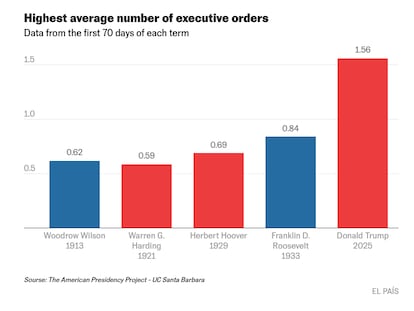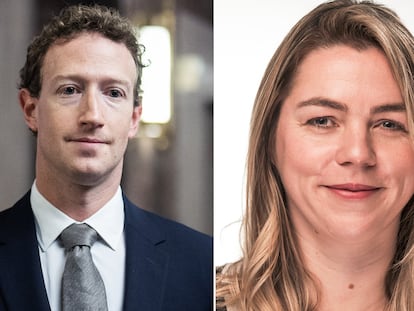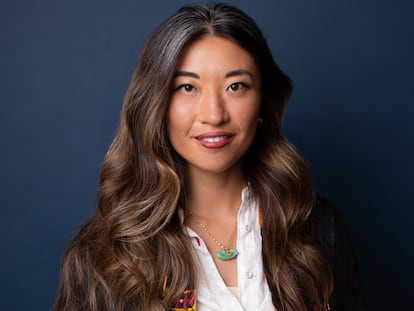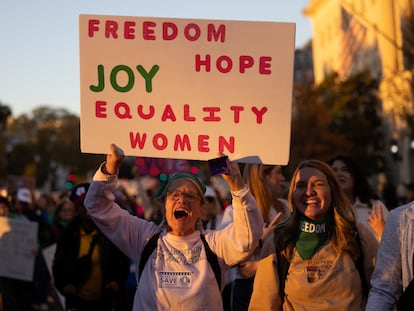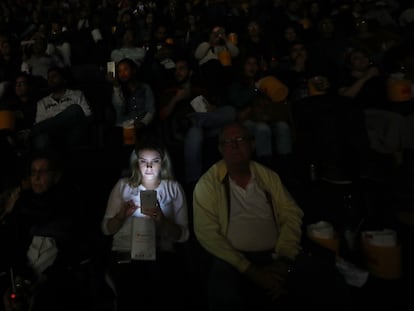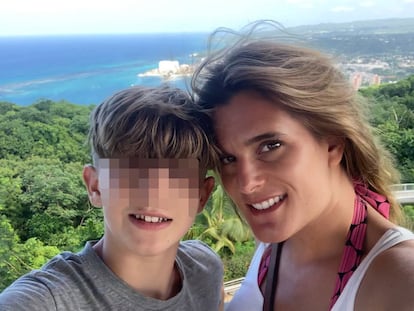In April 2000, the band sued a website for copyright infringement. They won, but their popularity was seriously affected and they didn’t achieve much: Napster had already dictated how we would listen to music in the 21st century
A study by the Colegio de México reveals that the CJNG is the most active in using social media to recruit adolescents
In a world that is hyper-connected in the digital sphere, yet isolated when it comes to real life, Latino culture can offer vital inspiration
We often assume that excessive device use plays a role, but we must also examine the parenting model that shapes a child’s development
Political consultant Antoni Gutiérrez-Rubí presents the ‘Trump Observatory,’ a space in which he analyzes Donald Trump’s political communication during his second presidential term for EL PAÍS. In this first installment, the ‘flooding the zone’ strategy
Critics say Elon Musk and Donald Trump are the high ‘priests’ of this phenomenon, warning that the unchecked use of AI could make the end of informed societies
Closed online communities and platforms offer us an accessible, aspirational, and increasingly cloned universe. And, following the dictates of ‘likes,’ algorithms erase differences and identities and transform us into passive users. Are we losing our personality?
An arbitration proceeding started by Mark Zuckerberg is barring former executive Sarah Wynn-Williams from granting interviews despite the media mogul’s advocacy of free speech on his social media
A study identifies the language of the internet based on text and images as a formula for representing the world view of groups that subscribe to hoaxes
Celebrities like Iker Casillas have become meme fodder over supposed overuse of a 15-year-old internet feature
As social media removes anti-hoax controls and relegates the serious media to the sidelines, China is jailing the journalist who documented the 2022 Zero-Covid protests in ‘Not the Foreign Force’. Yet Musk claims that the real tyranny comes from Keir Starmer in the United Kingdom
Meta’s decision to reduce content controls amplifies the most damaging effects of its platforms, as users are left without the necessary tools to combat harmful misinformation
Communication analysts criticize the replacement of professionals by X-style collective collaboration by Facebook and Instagram users against disinformation
Mark Zuckerberg’s company argues that its initiative to flag misinformation ‘became a tool to censor’ and will adopt an approach similar to community notes on X
Some artists and movements are claiming back the innocent world wide web of 25 years ago, but other experts note that all the current errors already existed back then, and that this nostalgia is preventing us from focusing on finding solutions
Platforms now include references to their generative artificial intelligence tools in their terms of service. They acknowledge that these tools may make errors, but place the responsibility on the user for the content they generate
Social media addiction can reduce grey matter, shorten attention spans, weaken memory, and distort core cognitive functions, according to recent research
The British researcher defends the validity of his most famous theory, 30 years after formulating it. Despite social media, he explains that humans can only have a maximum of 150 friends
A new study finds that it’s not the use of the internet, screens, or platforms that harms mental health, but rather the type of content consumed
Individuals who overemphasize the negative side of things can wind up limiting themselves and complicating the lives of those around them. Providing them with validation and assisting in the hunt for alternative viewpoints are two tactics you can take when you find yourself caught in their storm
Platforms that do not comply with the new rule may face fines of more than $30 million
The executive argues that the success of the social network she works for lies in the fact that, unlike other platforms, it offers users a wide range of options to customize the content they see
Societal hyper-connection has brought betrayal into a new era, filling therapists’ offices with people who haven’t slept with anyone else, but have committed so-called ‘emotional infidelity’
On social media, many Americans disappointed by Kamala Harris’ defeat are turning to this South Korean-born trend that calls on women to refuse to date, marry or have sex with men
Legend has it that Einstein purchased multiple versions of the same gray suit to avoid wasting brainpower on mundane decisions like choosing what to wear. This minimalist approach was later embraced by Steve Jobs. However, this philosophy of simplicity is being replaced by a new era marked by luxury and bling
With the exception of YouTube, no platform operating in the Latin American country offers open and free access to its data. The lack of transparency affects the monitoring of online violence against women
Jools Sweeney, 14, took his own life in 2022. Since then, his family has been trying to find out what influence his online activity may have had on his decision




